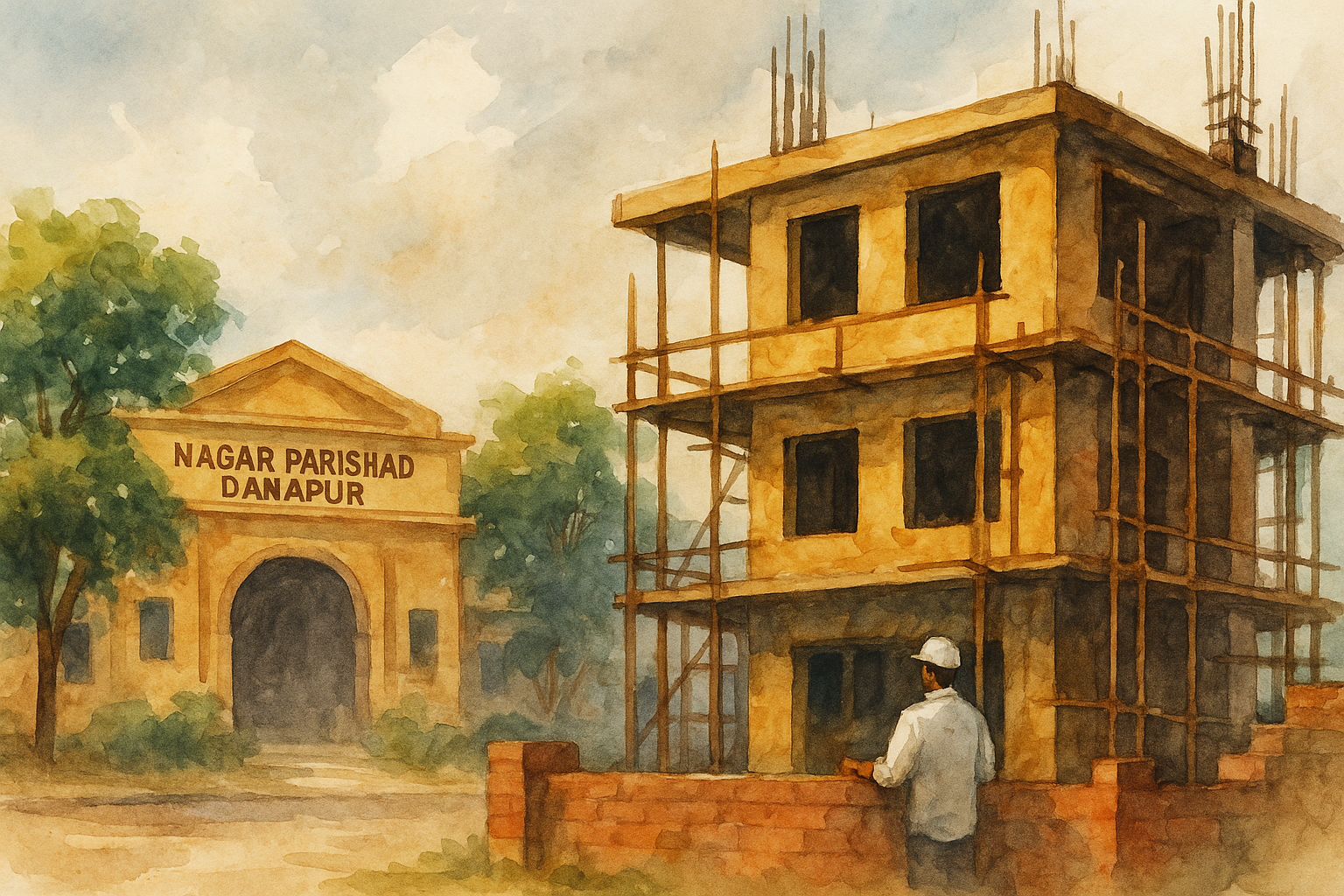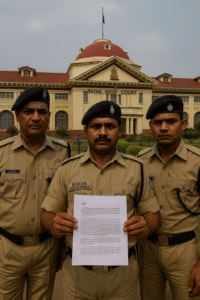Simplified Explanation of the Judgment
The Patna High Court, in a significant decision delivered on 26 March 2021, clarified that municipal authorities cannot halt a building construction merely on the basis of a private land ownership dispute between two parties. The Court held that the Executive Officer of the Danapur Nagar Parishad acted without jurisdiction when he stopped the petitioner’s ongoing construction under Section 323 of the Bihar Municipal Act, 2007, despite finding that the issue involved a dispute of title — which only a civil court can decide.
The case revolved around land ownership and development rights over a plot in Danapur, Patna. The petitioner had claimed ownership based on a family gift deed of 1984, while another person (respondent no. 10) claimed ownership under two sale deeds executed in 1971. The petitioner, having obtained building plan sanction in 2016, entered into a development agreement with private builders and commenced construction on the site.
In 2019, respondent no. 10 filed a complaint before the Danapur Nagar Parishad under Section 323 of the Bihar Municipal Act — the provision allowing the municipal authority to stop or demolish construction done without or contrary to a sanctioned plan. He alleged that the petitioner had no ownership rights and had obtained sanction by fraud. The Executive Officer, instead of deciding the ownership issue, directed that construction must remain stopped “until adjudication of title by a competent civil court.”
The petitioner challenged this order before the Patna High Court after the municipal building tribunal — the appellate forum — was found non-functional.
Petitioner’s stand
The petitioner argued that:
- The construction was undertaken strictly as per the sanctioned building plan.
- No finding had been recorded by the Nagar Parishad that the construction violated the plan or any law.
- The officer had no power to stop construction on grounds unrelated to building regulations, especially when title dispute was outside his jurisdiction.
Respondent’s stand
Respondent no. 10 (the complainant) argued that the petitioner’s grandfather had already sold the land in 1971, hence the subsequent gift deed of 1984 was void. He claimed that the petitioner obtained sanction by suppressing material facts and that his construction amounted to fraud. He also cited various legal principles, including “estoppel by deed,” and relied on the Supreme Court judgment Ritesh Tewari v. State of U.P., AIR 2010 SC 3823, to argue that equitable relief cannot be granted to someone guilty of suppression or fraud.
However, the High Court found these contentions unpersuasive in the present writ context.
Court’s findings
The Court carefully analyzed Section 323 of the Bihar Municipal Act, which empowers the Chief Municipal Officer to order demolition or stoppage of construction only when the work:
- Has been started or completed without sanction, or
- Is being carried out contrary to the sanction, or
- Is in violation of the Act, rules or regulations.
The Court held that none of these conditions were fulfilled. The Executive Officer had not recorded any finding that construction was illegal or contrary to the plan. On the contrary, he had admitted that the dispute was about ownership, which was beyond his jurisdiction. Therefore, his further direction to stop construction until civil court adjudication was legally unsustainable.
Justice Madhuresh Prasad noted that when an authority lacks jurisdiction, any order it issues is void, and the High Court can intervene under Article 226 even if an alternative remedy (like appeal) exists. The Court reiterated that existence of an alternative remedy is not an absolute bar to writ jurisdiction when the order is without jurisdiction.
The Court referred to its earlier ruling in Nagendra Prasad Gupta v. State of Bihar (CWJC No. 8769/2020), reiterating that writ jurisdiction may be exercised when:
- Fundamental rights are violated,
- Principles of natural justice are breached,
- The order is without jurisdiction, or
- The constitutionality of a law is under challenge.
Accordingly, the Court held that since the municipal building tribunal was non-functional and the order was clearly without jurisdiction, interference was justified.
Significance or Implication of the Judgment
This judgment is crucial for property developers, municipal authorities, and citizens in Bihar. It draws a clear line between municipal regulatory powers and civil property disputes.
- Municipal officers can act only when construction violates building laws or sanctioned plans, not when land ownership is disputed.
- Stopping construction solely due to rival title claims amounts to overreach and can be quashed by the High Court.
- The ruling strengthens protection for developers and landowners against arbitrary stoppage orders by local bodies, ensuring that civil courts alone decide property title disputes.
- It also highlights the judiciary’s role in stepping in when statutory tribunals are non-functional, preventing denial of justice due to administrative vacuum.
For government authorities, this decision underscores the importance of adhering strictly to statutory limits and avoiding interference in matters outside municipal jurisdiction.
Legal Issue(s) Decided and the Court’s Decision
- Issue 1: Whether the City Executive Officer had jurisdiction under Section 323 of the Bihar Municipal Act to stop construction based on a title dispute.
Decision: No. The officer’s power under Section 323 is confined to cases where construction is without sanction or in violation of the Act or Rules. As no such finding existed, the stoppage order was without jurisdiction. - Issue 2: Whether the High Court could exercise writ jurisdiction despite the existence of an appellate remedy.
Decision: Yes. Since the municipal building tribunal was non-functional and the impugned order was without jurisdiction, the High Court rightly exercised its power under Article 226. - Issue 3: What relief was granted to the petitioner.
Decision: The High Court quashed the order dated 04.09.2020 issued by the City Executive Officer, Danapur Nagar Parishad, holding it illegal and unsustainable. The Court, however, left open the right of either party to approach a civil court to establish ownership.
Judgments Referred by Parties
- Ritesh Tewari & Anr. v. State of U.P. & Ors., AIR 2010 SC 3823.
- Suraj Lamp & Industries (P) Ltd. v. State of Haryana & Anr., (2009) 7 SCC 363.
- AIR 1956 SC 44 (Estoppel by deed principle).
Judgments Relied Upon or Cited by the Court
- Nagendra Prasad Gupta v. State of Bihar & Ors., CWJC No. 8769 of 2020 (Patna High Court, decided on 13.01.2021).
- Union of India v. Tantia Construction (P) Ltd., (2011) 5 SCC 697.
- M.P. State Agro Industries Dev. Corp. Ltd. v. Jahan Khan, (2007) 10 SCC 88.
- L.K. Verma v. H.M.T. Ltd., (2006) 2 SCC 269.
Case Title
Petitioner v. State of Bihar & Ors.
Case Number
Civil Writ Jurisdiction Case No. 10857 of 2020
Citation(s)
2021(2) PLJR 694
Coram and Names of Judges
Hon’ble Mr. Justice Madhuresh Prasad
Names of Advocates and who they appeared for
- For the petitioner: Mr. Karandeep Kumar, Advocate
- For the State: Mr. Zaki Haider, A.C. to A.G.
- For respondents no. 8 & 9 (developers): Mr. Sandeep Kumar, Advocate; Mr. Jai Ram Singh, Advocate
- For respondent no. 10: Mr. K.N. Chaubey, Sr. Advocate; Mr. Ambuj Nayan Chaubey, Advocate
Link to Judgment
MTUjMTA4NTcjMjAyMCMxI04=-4wBx0eQVGBk=
If you found this explanation helpful and wish to stay informed about how legal developments may affect your rights in Bihar, you may consider following Samvida Law Associates for more updates.








